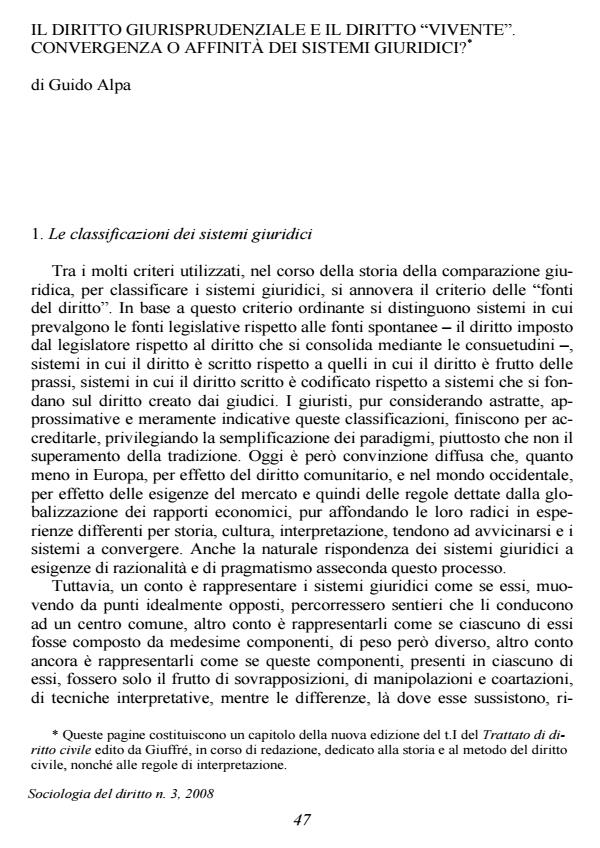Il diritto giurisprudenziale e il diritto "vivente". Convergenza o affinità dei sistemi giuridici?
Titolo Rivista SOCIOLOGIA DEL DIRITTO
Autori/Curatori Guido Alpa
Anno di pubblicazione 2009 Fascicolo 2008/3
Lingua Italiano Numero pagine 35 P. 47-81 Dimensione file 265 KB
DOI 10.3280/SD2008-003002
Il DOI è il codice a barre della proprietà intellettuale: per saperne di più
clicca qui
Qui sotto puoi vedere in anteprima la prima pagina di questo articolo.
Se questo articolo ti interessa, lo puoi acquistare (e scaricare in formato pdf) seguendo le facili indicazioni per acquistare il download credit. Acquista Download Credits per scaricare questo Articolo in formato PDF

FrancoAngeli è membro della Publishers International Linking Association, Inc (PILA), associazione indipendente e non profit per facilitare (attraverso i servizi tecnologici implementati da CrossRef.org) l’accesso degli studiosi ai contenuti digitali nelle pubblicazioni professionali e scientifiche.
Jurisprudential Law and "Living Law": Convergence or Affinity of Legal Systems? - One of the many criteria used to classify legal systems in the course of the history of comparative law is that of "legal sources". On the basis of this criterion of classification, systems in which legislative sources prevail are distinguished from spontaneous sources so the law as enacted by the legislator from the law as consolidated by means of customs, systems in which law is written from those in which the law is the result of practice, systems in which written law is codified from those based on law created by judges. Although they consider these classifications to be abstract, approximate and merely indicative, lawyers end up giving them credit, preferring to simplify paradigms rather than consign tradition to the past. However, there is a widespread belief nowadays that, while legal systems have their roots in different historical, cultural and interpretative experiences, they are tending to grow ever closer and converge, at least in Europe, as a result of European Union law, and in the Western world as a whole, as a result of market requirements and so of the rules dictated by the globalisation of economic relations. The natural tendency of legal systems to cater for requirements of rationalism and pragmatism also favour this process. As a result of a thorough revision of the categories inherited from tradition, among other things, it is no longer feasible to portray the Western world’s systems as in antithesis, but more as in affinity, as they are "mixed" in nature: all of them actually feature both written and unwritten sources and all of them have variable structures, as written sources have prevailed at one time in history and unwritten sources at another time. Of course there are differences between the ways in which the administration of justice, the structure of the courts, the process of forming and interpreting the law and the application of the criteria of interpretation are organised, but these divergences have ultimately been substantially attenuated in the course of recent decades. Building on the emergence of jurisprudence, in the form of case law, on its configuration as a source of law and on the accreditation of the concept of "living law", as the law that is actually applied by its interpreter, sometimes in creative ways, as well as the affirmation of professional codes of conduct and self-discipline, the Italian system now takes the form of a "mixed" and "elastic" system that, it may be argued, even verges on the "mild".
- The Influence of Human Rights and Basic Rights in Private Law Emanuela Navarretta, Elena Bargelli, pp.421 (ISBN:978-3-319-25335-0)
Guido Alpa, Il diritto giurisprudenziale e il diritto "vivente". Convergenza o affinità dei sistemi giuridici? in "SOCIOLOGIA DEL DIRITTO " 3/2008, pp 47-81, DOI: 10.3280/SD2008-003002